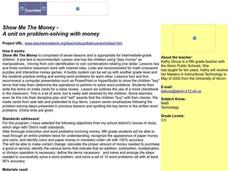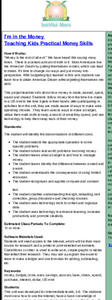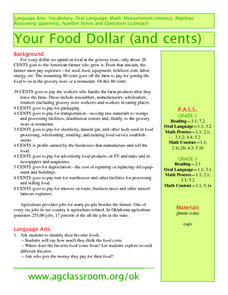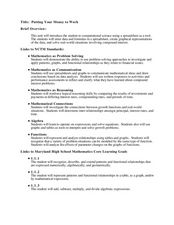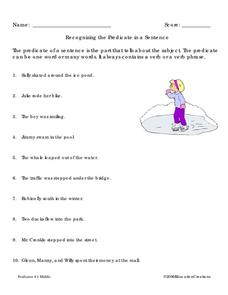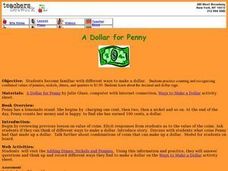Federal Reserve Bank
Something Special For Me
People often save money, but what are the benefits and drawbacks of that action? Youngsters learn about saving, savings, and opportunity cost through the lens of a short book, called Something Special for Me.
Missouri Department of Elementary
How Much Does Smoking Really Cost?
Following a brief survey about tobacco, scholars examine a fact sheet to answer questions about the substance. A practice page challenges the class to determine the cost of the habit using money math. Pupils discuss their findings...
Curated OER
ADULT ESOL LESSON PLAN--Concepts of Time and Money
Students identify different denominations of United States currency and symbols associated with money and reading prices. In addition, in pairs they identify examples of currency from newspapers and magazines.
Curated OER
Show Me The Money
Learners use "play money" as manipulatives, moving from coin identification to coin combinations totaling one dollar. They combine classroom work with Internet sites. Students use a buddy system to practice writing and solving word...
Curated OER
I'm in the Money - Practical Money Skills
Students make a budget and utilize math skills to keep a record of what they spend. They use technology and spreadsheets to help them keep track of their money.
Curated OER
All About Money Curriculum
Students participate in different pre-lessons to examine the role of individuals and neighborhoods. They also discover the role of the IMF and nations around the world.
Curated OER
ESOL: Time and Money
Learners study time and money. They read and practice cardinal numbers using numerals and words. They collaborate in apirs and exchange flashcards identifying cardinal numbers 0-10. They complete an activity sheet and show pictures and...
Curated OER
A Visit to the Mint
Emerging consumers recognize the types and denominations of U.S. currency. They listen to a guest speaker (if possible) and view a video. They create their own money using styrofoam and a toothpick for engraving. Consider creating a...
EngageNY
Problem Solving When the Percent Changes
Use more than one whole to solve percent problems. The ninth installment in a 20-part series has pupils work percent problems in which they must determine two wholes. Individuals use double number lines to represent and solve the...
Curated OER
My Foot and the Standard Foot
Young mathematicians put one foot in front of the other as they learn how to measure length in an elementary math lesson. Using paper cutouts of their own feet, children measure classroom objects as they discover the importance of...
Curated OER
Your Food Dollar (and Cents)
Young scholars examine where their food dollars go while recognizing coins and making change. They identify their favorite foods, receive one dollar, and take away amounts for each person involved in the production of their food dollar.
Curated OER
Identify Coins Worksheet (b/w)
In this coin identification worksheet, students look at the pictures of the coins on the left and the names of the coins on the right. Students draw a line to match the 4 coins to their name.
Curated OER
Identify Coins Worksheet (color)
In this coin identification worksheet, students look at the pictures of the coins on the left and the names of the coins on the right. Students draw a line to match the 4 coins to their name.
Curated OER
Count On It!
Students investigate money. In this consumer math lesson plan, students use coins, identify their value, then group them in various ways to equal a dollar.
Curated OER
Real-World Reasonableness
Fifth graders apply math to real-world situations. In this mathematics lesson, 5th graders are read the book, "Math Curse," which discusses ways in which math is used each day. Students then write a sequel to the book in groups,...
Curated OER
Penny, Nickel, Dime
Second graders recognize and compare the value of pennies, nickels, and dimes. They review counting pennies, nickels, and dimes.
Curated OER
Why Does Money Have Value?
Students study money and its value and usage in the world today. In this economic lesson, students research money as they learn what it stands for, why it is important, how it is valued and what it represents in the United States.
Curated OER
Putting Your Money to Work
Students create a collect data on expenses. In this algebra lesson, students create a spreadsheet to solve scientific equations. They incorporate math, science and technology in this lesson.
Curated OER
Math--Recognizing and Matching Numbers
In this recognizing and matching numbers worksheet, students draw a circle around the bunnies from each hutch and then draw a line from the bunnies to the hutches to show where they belong. Students fill in the missing numbers in 5...
Curated OER
Recognizing the Predicate in a Sentence
In this grammar worksheet, students will learn how to find the predicate in a sentence. Then students will find and circle 10 predicates in different sentences.
Curated OER
Spending Plans
Students explore the concept of dividing their money into categories, namely "save," "spend," and "share." They engage in activities that help them explain that money is limited in quantity and must be divided for different purposes.
Curated OER
A Rooster and a Bean Seed
Students hear a folk tale and participate in a simulation that helps them recognize problems with barter and benefits of monetary exchange.
Curated OER
Battle of "The Cents"
Young scholars explore money. In this counting money lesson, students play a card game using the rules of "War." Young scholars turn over cards, determine the money value represented, and the student with the highest value keeps the cards.
Curated OER
A Dollar for Penny
Students demonstrate different ways to make a dollar. For this consumer math lesson, students read the book A Dollar for Penny and identify the value of each coin. Students determine combinations of coins that can make up a dollar.





